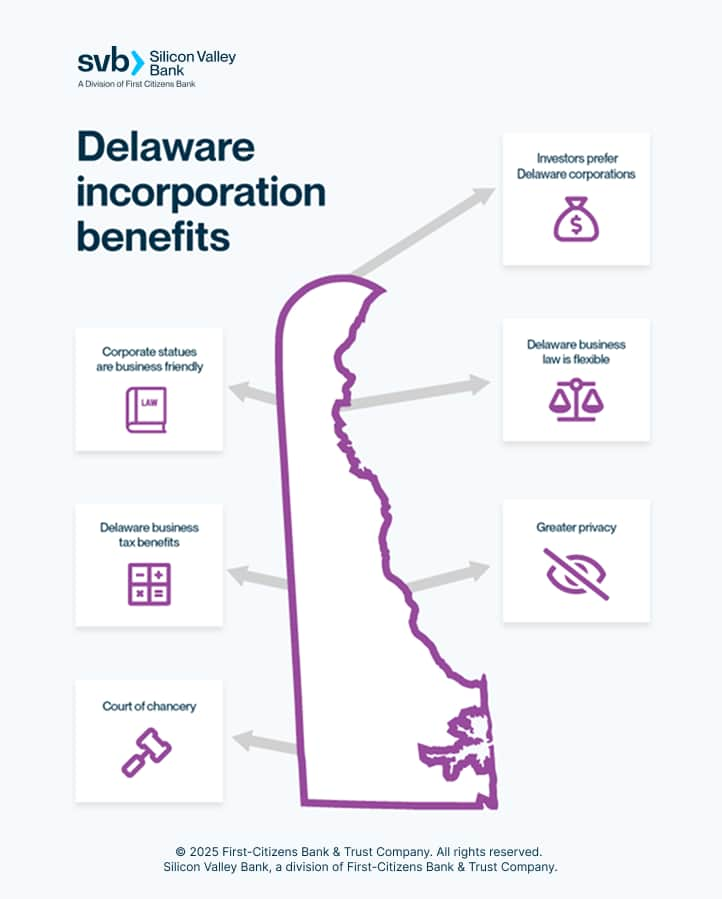- The benefits of incorporating in Delaware generally favor large public corporations with thousands of stockholders.
- If you are seeking outside funding for your startup, Delaware incorporation may be required by VCs or angel investors.
- For smaller, privately held companies, it is generally more efficient to incorporate where your main office is located.
More than two-thirds of Fortune 500 companies and most high-growth technology startups are incorporated in Delaware. A Delaware corporation is a business structure registered in Delaware, offering a distinct legal and regulatory environment known for its flexibility and advantageous Court of Chancery. It's a popular choice for companies seeking investment or planning to go public, but it's essential to understand whether the benefits of incorporating in Delaware align with your specific business needs. This article explores frequently asked questions, as well as the benefits and drawbacks, to help you decide.
Should you incorporate in Delaware?
It depends on your business goals. Delaware is often the top choice for large corporations and VC-backed startups seeking investors or planning an IPO, thanks to its streamlined legal environment. However, incorporating in your home state may be more advantageous for small, locally focused or self-funded businesses.
What does it mean when a company is a Delaware corporation?
A Delaware corporation is simply a company that has chosen to incorporate legally in the state of Delaware, regardless of where its physical operations are located. This decision subjects the company to Delaware's corporate laws, known for their flexibility and advantages for businesses.
Can you incorporate in Delaware if you don't live there?
Yes, you can incorporate in Delaware even if you don't live there. In fact, most Delaware corporations are based outside of the state. Delaware law does not require business owners, shareholders, officers or directors to reside in Delaware.

Benefits of incorporating in Delaware
While the optimal timing for incorporation varies, it’s generally advisable to incorporate sooner than later to limit personal liability. Incorporating, along with registering trademarks and patents, helps protect intellectual property and establishes credibility needed for investors and customers. Corporations can seek incorporation in any state, and there are different ways to incorporate. Many VC-backed startups choose Delaware to set up a C-Corp even though they never intend to have an office there.

Why do so many companies incorporate in Delaware?
Delaware's popularity for incorporation stems from several key advantages:
- Predictable legal environment: The Delaware Court of Chancery, specializing in corporate law, offers a stable and predictable legal framework.
- Flexible corporate statutes: Delaware's corporate statutes are known for their flexibility and adaptability to changing business needs.
- Business-friendly tax laws: Delaware offers attractive tax benefits for businesses, particularly those operating nationally or internationally.
- Investor preference: Venture capitalists and investors often prefer companies incorporated in Delaware due to its established legal and financial ecosystem.
Flexibility of Delaware corporate law
Delaware’s statutes — like the Delaware General Corporation Law (DGCL) and the Limited Liability Company Act — are often used as models for other states. To keep Delaware at the forefront, state legislators regularly update business-friendly statutes in collaboration with corporate attorneys specializing in Delaware’s incorporation law.
Delaware has historically offered a highly flexible legal framework for corporations, allowing businesses to tailor their governance structures to their specific needs. This adaptability remains a key advantage, though recent amendments to the DGCL have introduced important changes that businesses should review.
While core benefits of Delaware incorporation remain, such as directors and officers not being required to reside in the state, recent DGCL amendments may impact certain aspects of corporate governance, including shareholder access to records and director responsibilities.
For the most up-to-date information and to understand the full implications of these changes, consult with legal counsel specializing in Delaware corporate law. You can also access the latest version of the DGCL and other relevant resources on the Delaware Division of Corporations website.
What are the advantages of a Delaware corporation?
One primary advantage of a Delaware corporation is access to the Court of Chancery. This provides a predictable and efficient legal process for resolving business disputes. Additionally, Delaware's flexible corporate statutes allow for greater freedom in structuring and managing your business. Delaware corporations also benefit from favorable tax laws, which can result in significant cost savings.
The Delaware Court of Chancery: A key advantage
The Delaware Court of Chancery is one of the country’s oldest law courts, and they handle only corporation cases. Instead of juries, decisions are made by judges who are corporate law experts, so decisions handed down by the court are generally more predictable than those in other states.
If your business should become involved in litigation, you’ll likely have a judge with considerable expertise in complex corporate law. As Delaware is so popular for incorporation, most corporate attorneys are familiar with its business law, which can help streamline legal processes.
Delaware corporate tax advantages
Although other states are attracting founders who are incorporating with no corporate taxes, Delaware still has very business-friendly tax laws. For example, the “Delaware loophole” may allow companies to declare certain types of revenue in Delaware, potentially minimizing their overall tax burden. However, the implications of these laws can be intricate and vary depending on your business structure and operations. Consulting with a tax expert is highly recommended. Some specific advantages of Delaware's tax structure include:
- No corporate income tax: Delaware does not collect corporate taxes from companies incorporated there but not operating within the state. However, these companies are still subject to Delaware's annual franchise tax.
- No tax on intangible assets: Delaware generally does not tax royalty payments or other intangible assets received by companies not operating within the state.
- No tax on stock held out-of-state: Delaware does not tax stock shares owned by people outside of Delaware.
Investors prefer Delaware corporations
While Delaware incorporation offers numerous advantages for startups, investors have additional, unique reasons for preferring this structure. If you anticipate seeking outside funding, incorporating in Delaware upfront can be a strategic move to attract and satisfy investors. Venture capitalists, private equity firms and investment banks often prefer, and sometimes require, Delaware incorporation for their portfolio companies. Here's why:
- Portfolio management: Delaware's predictable legal environment and efficient Court of Chancery streamline dispute resolution and simplify complex transactions, making portfolio management more efficient for investors.
- Reduced investment risk: The extensive body of corporate law precedent in Delaware provides greater certainty in legal matters, minimizing investment risk.
- Stronger investor protections: Delaware law offers robust protections for investors' rights, providing a secure and transparent investment environment.
- Facilitated exit strategies: Delaware's legal framework is well-suited for mergers, acquisitions and IPOs, making it easier for investors to realize returns on their investments.
What are the disadvantages of a Delaware corporation?
There are benefits to companies who incorporate within Delaware, but they are primarily for large corporations. Carefully assess the additional costs involved against the benefits of incorporating in Delaware before deciding. You could be encountering considerable costs and other drawbacks. Here are several to consider.
- Foreign qualification costs: If your company is incorporated in one state and is now seeking to do business in a second, you’re now “foreign” corporation must register and pay fees in each state. This can add up quickly as you expand.
- Registered agent costs: Delaware requires you to have a registered agent in the state, which is an additional expense.
- Franchise taxes: Delaware has an annual franchise tax based on your share value. While minimal for small businesses, these costs can increase as your company grows. You may also owe franchise taxes in your home state outside of Delaware.
- Multiple reporting requirements: You must meet filing and licensing requirements in both Delaware and your home state, doubling your annual reports and increasing administrative work.
- Nominal tax advantages: Delaware is a tax-friendly, but taxes are ultimately paid where the money is made. Incorporating in Delaware doesn't exempt you from tax liability in your home state.
Recent developments and trends in Delaware incorporation
Delaware's corporate landscape is constantly evolving. Here are some recent developments and trends to be aware of:
- Amendments to the DGCL: In March 2025, significant amendments to the DGCL were enacted, impacting fiduciary duties and conflicted transactions. These changes aim to provide more clarity and predictability for corporations.
- DExit concerns: There’s growing concern about a potential exodus of companies from Delaware ("DExit") due to perceived shifts in the legal landscape. Some companies, including high-profile examples like Tesla and Roblox, have already left or announced plans to leave.
- Competition from other states: Other states, such as Nevada and Texas, are actively competing with Delaware by offering attractive business incentives and establishing specialized business courts.
These recent developments reinforce the importance of conducting thorough due diligence and seeking expert legal and financial advice before deciding about incorporating in Delaware.

How to incorporate in Delaware
It isn’t difficult or particularly expensive to form a corporation in Delaware. Here are 11 steps you should follow:
1. Choose your corporate name: Your name needs to be unique — not deceptively similar to another firm — and it must include one of the following words: association, company, corporation, club, foundation, fund, incorporated, institute, society, union, syndicate or limited.
2. Choose your business entity type: Decide if you want to be a limited liability company (LLC), a C Corp, an S Corp, a statutory trust or a limited partnership. See our article for more information.
3. Appoint a registered agent: Every Delaware corporation must have an in-state “agent for service of process.” This can be either an individual or corporation that can accept legal papers on the corporation's behalf if it is sued.
4. File a certificate of incorporation: Your corporation is a legal entity after you file a Certificate of Incorporation — Stock Certificate with the Delaware Secretary of State.
5. Secure a certificate of good standing: To open a corporate account, many financial institutions will require a good standing certificate or a certified copy of your new entity filing. You can order one at the same time you file your Certificate of Incorporation.
6. File articles of incorporation: These can be filed online or by mail and must include a Filing Cover Memo, the corporation's name, office street address and the name of your registered agent. You also need to specify the number of shares the corporation is authorized to issue, the corporation’s purpose, and the name and mailing address of the incorporator.
7. Prepare corporate bylaws: These aren’t required by Delaware, but an internal document that sets out your basic ground rules for operating your corporation helps to show banks, investors, the IRS and others that your corporation is legitimate.
8. Appoint directors and hold board meetings: The person who signed the articles is the “incorporator” and he or she appoints the initial corporate directors. At the first board meeting, the directors should:
-
- Appoint corporate officers
- Adopt bylaws
- Select a corporate bank
- Authorize the issuance of shares of stock
- Set the corporation's fiscal year
- Adopt an official stock certificate form and corporate seal
9. Issue stock: In return for capital contributions of cash, property, services or all three, you can issue stock. This is usually issued as paper certificates, and stockholders are recorded in the corporation’s stock transfer ledger.
10. File annual report and pay franchise tax: As a Delaware corporation, you are required to file an annual report and pay a franchise tax no later than March 1.
11. Obtain an EIN: You need to acquire an Employer Identification Number (EIN) by completing an application on the IRS website.
See Delware.gov for more information and to access the necessary forms.
Making the right choice: Is Delaware incorporation right for you?
Put simply, here's who benefits most from Delaware incorporation:
- Large corporations: Delaware's legal framework is well-suited for complex corporate structures and transactions.
- Startups seeking VC funding: Many VCs and investors prefer or require Delaware incorporation.
- Companies planning an IPO: Delaware's established legal and financial ecosystem simplifies the IPO process.
On the other hand, if you’re smaller, locally focused and self-funded, Delaware incorporation may not be worth the additional cost or increased work. In many cases, incorporating in your home state is a more practical choice.
Choosing where to incorporate is a significant decision that can impact your company’s growth and operations. Take time to evaluate your business goals and consult with trusted legal and financial advisors to ensure you’re making the best choice for your unique situation. For more insights on building and scaling your startup, explore our Startup Insights or stay informed on the latest trends with our State of the Markets report.
FAQs
Should you incorporate in Delaware?
It depends on your business goals. Delaware is often the top choice for large corporations and VC-backed startups seeking investors or planning an IPO, thanks to its streamlined legal environment. However, incorporating in your home state may be more advantageous for small, locally focused or self-funded businesses.
What does it mean when a company is a Delaware corporation?
A Delaware corporation is simply a company that has chosen to legally incorporate in the state of Delaware, regardless of where its physical operations are located. This subjects the company to Delaware's corporate laws, known for their flexibility and advantages for businesses.
Can you incorporate in Delaware if you don't live there?
Yes, you absolutely can incorporate in Delaware even if you don't live there. In fact, most Delaware corporations are based outside of the state. Delaware law does not require business owners, shareholders, officers or directors to reside in Delaware.
Why do so many companies incorporate in Delaware?
Delaware's popularity for incorporation stems from several key advantages:
- Predictable legal environment: The Delaware Court of Chancery, specializing in corporate law, offers a stable and predictable legal framework.
- Flexible corporate statutes: Delaware's corporate statutes are known for their flexibility and adaptability to changing business needs.
- Business-friendly tax laws: Delaware offers attractive tax benefits for businesses, particularly those operating nationally or internationally.
- Investor preference: Venture capitalists and investors often prefer companies incorporated in Delaware due to its established legal and financial ecosystem.
Who might not benefit as much?
- Small, locally focused businesses: The additional costs and administrative burden of Delaware incorporation might outweigh the benefits for businesses operating primarily within a single state.
- Self-funded businesses: Companies without outside investors may not need the specific advantages Delaware offers.











